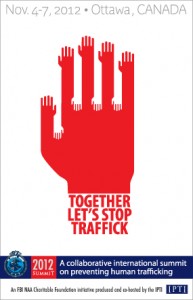By Leischen Stelter
When Deputy Chief Kim Derry (retired) of the Toronto Police Service was acting president of the FBINAA in 2010, he traveled around the world meeting with different FBINAA chapters. One of the issues that kept coming up, time and time again, was the issue of human trafficking and the tremendous growth and impact modern-day slavery was having around the world. As a result, human trafficking—and the various criminal activities associated with it—became an issue that the FBINAA decided to take action on.
One of the biggest hurdles in combatting human trafficking was the fact that there wasn’t a central entity collecting and disseminating information and data about human trafficking. Derry and FBINAA leadership decided that developing a worldwide International Resource and Coordination Centre was the next step in the global effort to fight human trafficking.
But it was a huge step. It’s a fairly daunting task not only in the scale of the problem (27 million people worldwide are estimated to be victims of slavery!), but also in the effort to get different countries and organizations on board with a coordinated effort.
The FBINAA met with and received endorsements from major organizations such as the United Nations and Interpol, as well as non-profit and volunteer agencies from around the globe who are involved with anti-trafficking efforts. The solution was to develop a summit to come together and strategize about the best way to develop a central coordination center focusing on gathering and processing data and information about human trafficking.

“We will identify solutions and create working groups who will then leave the summit with actionable items to follow up on. The summit will be an annual event where people come back and report on what they’ve done and then move onto the next phase. Through this process, we hope to build the center in a 2-3 year period,” Derry told me in a phone interview.
“This is first of a kind,” he said. “We’re hoping that each country can take from the summit the information it needs and bring it back to the country and make its own coordination center.” This event is open to anyone who is passionate about stopping human trafficking. “People just need to come to the summit armed with information and passion,” he said.
As a former law enforcement leader, Derry said human trafficking is a crime that can often be overlooked or mistaken for something else. For example, law enforcement often misinterprets prostitution as an individual crime rather than part of a larger criminal enterprise. “Rarely are prostitutes seen as victims, but in reality many are not willing participants in most of those cases,” said Derry. There needs to be better education for law enforcement about human trafficking. (For more information on indicators of human trafficking, go here.)
In general, there isn’t that much information and data on the scale of human trafficking. While there are some reports being produced by government agencies, the body of information is generally small and incomplete. In conjunction with the FBINAA, American Military University and American Public University have dedicated a section of its online library to compiling resources and research on human trafficking. Check out the library here. The university has made this library feature open web content, so it’s available to everyone. The university has done this to encourage everyone to further research human trafficking and contribute to the gaps in information about this enormous criminal enterprise.
If you are interested in attending the Together Let’s Stop Traffick summit in Ottawa, you can apply here. Staff and faculty of AMU and APU will be attending this event, so please check back for more information about this global effort to combat human trafficking.
Comments are closed.